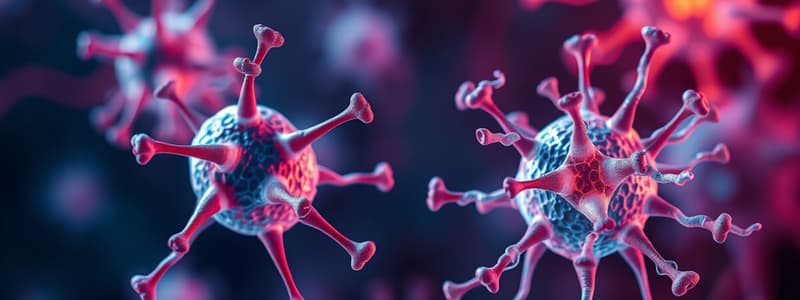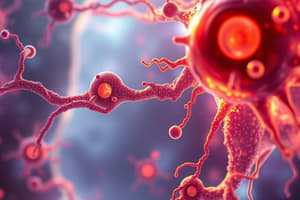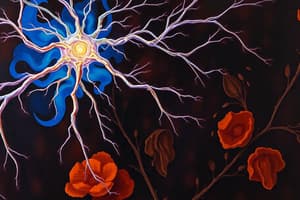Podcast
Questions and Answers
What is a receptor?
What is a receptor?
- A chemical messenger
- A component of DNA
- A type of hormone
- A protein on the surface of a cell (correct)
What happens when external substances bind to a receptor?
What happens when external substances bind to a receptor?
It directs the cell to do something, such as divide, die, or allow specific substances to enter or exit the cell.
What initiates the creation of a receptor protein in a cell?
What initiates the creation of a receptor protein in a cell?
The cell's DNA contains the instructions.
Receptors cannot be recycled into the cell after they have been expressed.
Receptors cannot be recycled into the cell after they have been expressed.
What is down-regulation?
What is down-regulation?
What is up-regulation?
What is up-regulation?
How do cells recognize chemical signals?
How do cells recognize chemical signals?
Which of the following are types of chemical messages?
Which of the following are types of chemical messages?
What is the purpose of cell signaling?
What is the purpose of cell signaling?
Flashcards are hidden until you start studying
Study Notes
Receptors
- Proteins located on the cell surface that receive external chemical messengers.
- Binding of substances to receptors directs cellular actions such as division, apoptosis, or material transport.
Life Cycle of Receptors
- Receptors are synthesized based on DNA instructions within the cell.
- Once created, receptors are expressed on the cell membrane, enabling the cell to respond to specific signals.
Down Regulation
- Receptors can be internalized and recycled, resulting in fewer receptors on the cell membrane.
- Reduction in receptors decreases cell sensitivity to specific messages, termed down-regulation.
Up Regulation
- In response to weak signals, cells increase receptor production to enhance sensitivity, known as up-regulation.
- The cell's heightened responsiveness occurs as more receptors for the message are present.
Cell Signal Recognition
- Target cells possess specific functional receptors for chemical messages; without them, the cells cannot be influenced.
- Analogy: Cells act like radios; they need tuned receivers to process signals effectively and respond accordingly.
Types of Chemical Messages
- Chemical messages include hormones, neurotransmitters, cytokines, growth factors, cell recognition molecules, and toxins.
- These messages originate from various systems: endocrine (hormones), nervous (neurotransmitters), immune (cytokines).
Cell Signaling
- Cells must receive and process external signals to react to environmental changes.
- They can receive multiple signals simultaneously and integrate this information into a cohesive response.
Studying That Suits You
Use AI to generate personalized quizzes and flashcards to suit your learning preferences.




